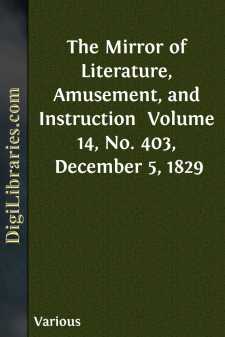Categories
- Antiques & Collectibles 13
- Architecture 36
- Art 48
- Bibles 22
- Biography & Autobiography 813
- Body, Mind & Spirit 142
- Business & Economics 28
- Children's Books 16
- Children's Fiction 13
- Computers 4
- Cooking 94
- Crafts & Hobbies 4
- Drama 346
- Education 46
- Family & Relationships 57
- Fiction 11829
- Games 19
- Gardening 17
- Health & Fitness 34
- History 1377
- House & Home 1
- Humor 147
- Juvenile Fiction 1873
- Juvenile Nonfiction 202
- Language Arts & Disciplines 88
- Law 16
- Literary Collections 686
- Literary Criticism 179
- Mathematics 13
- Medical 41
- Music 40
- Nature 179
- Non-Classifiable 1768
- Performing Arts 7
- Periodicals 1453
- Philosophy 64
- Photography 2
- Poetry 896
- Political Science 203
- Psychology 42
- Reference 154
- Religion 513
- Science 126
- Self-Help 84
- Social Science 81
- Sports & Recreation 34
- Study Aids 3
- Technology & Engineering 59
- Transportation 23
- Travel 463
- True Crime 29
The Mirror of Literature, Amusement, and Instruction Volume 14, No. 403, December 5, 1829
by: Various
Categories:
Description:
Excerpt
Fall of the Staubbath.
In the poet and the philosopher, the lover of the sublime, and the student of the beautiful in art—the contemplation of such a scene as this must awaken ecstatic feelings of admiration and awe. Its effect upon the mere man of the world, whose mind is clogged up with common-places of life, must be overwhelming as the torrent itself; perchance he soon recovers from the impression; but the lover of Nature, in her wonders, reads lessons of infinite wisdom, combined with all that is most fascinating to the mind of inquiring man. In the school of her philosophy, mountains, rivers, and falls not only astonish and delight him in their vast outlines and surfaces, but in their exhaustless varieties and transformations, he enjoys old and new worlds of knowledge, apart from the proud histories of man, and the comparative insignificance of all that he has laboured to produce on the face of the globe.
Few have witnessed the Staubbach, or similar wonders without acknowledging the force of their impressions. This Fall is in the valley of Lauterbrun, the most picturesque district of Switzerland. Simond, in describing its beauties, says, "we began to ascend the valley of Lauterbrun, by the side of its torrent (the Lutschine) among fragments of rocks, torn from the heights on both sides, and beautiful trees, shooting up with great luxuriance and in infinite variety; smooth pastures of the richest verdure, carpeted over every interval of plain ground; and the harmony of the sonorous cow-bell of the Alps, heard among the precipices above our heads and below us, told us we were not in a desart." "The ruins of the mineral world, apparently so durable, and yet in a state of incessant decomposition, form a striking contrast with the perennial youth of the vegetable world; each individual plant, so frail and perishable, while the species is eternal in the existing economy of nature. Imperceptible forests of timber scarcely tinge their inert masses of gneiss and granite, into which they anchor their roots; grappling with substances which, when struck with steel, tear up the tempered grain, and dash out the spark." This may be an enthusiastic, but is doubtless the faithful, impression of our tourist; and in descriptions of sublime nature, we should
Survey the whole; nor seek slight fault to find,
Where Nature moves, and rapture warms the mind.
Each valley has its appropriate stream, proportioned to its length, and the number of lateral valleys opening into it. The boisterous Lutschine is the stream of Lauterbrun, and it carries to the Lake of Brientz scarcely less water than the Aar itself. About half way between Interlaken and Lauterbrun, is the junction of the two Lutschines, the black and the white, from the different substances with which they have been in contact.
Simond says, "after passing several falls of water, each of which we mistook for the Staubbach, we came at last to the house where we were to sleep. It had taken us three hours to come thus far; in twenty minutes more we reached the heap of rubbish accumulated by degrees at the foot of the Staubbach; its waters descending from the height of the Pletschberg, form in their course several mighty cataracts, and the last but one is said to be the finest; but is not readily accessible, nor seen at all from the valley....












